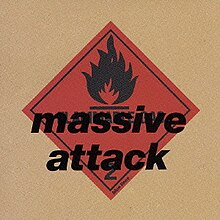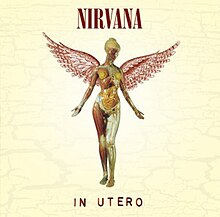milo
Jack L. Jones
Our seventh game of the second round sees a class of trans-Atlantic titans as Massive Attack take on Nirvana. You've got about a day to gas about the albums before a poll is added.
Massive Attack - Blue Lines

Blue Lines is the debut album by English trip hop group Massive Attack, released on their Wild Bunch label through Virgin Recordson 8 April 1991.
"We worked on Blue Lines for about eight months, with breaks for Christmas and the World Cup," said 3D, "but we started out with a selection of ideas that were up to seven years old. Songs like 'Safe from Harm' and 'Lately' had been around for a while, from when we were The Wild Bunch, or from our time on the sound systems in Bristol. But the more we worked on them, the more we began to conceive new ideas too – like, 'Five Man Army' came together as a jam."[4]
Blue Lines is generally considered the first trip hop album,[5] although the term was not widely used before 1994.
The album reached No. 13 on the UK Albums Chart; sales were limited elsewhere. A fusion of electronic music, hip hop, dub, '70s souland reggae, it established Massive Attack as one of the most innovative British bands of the 1990s and the founder of trip hop'sBristol Sound.[6]
Music critic Simon Reynolds stated that the album also marked a change in electronic/dance music, "a shift toward a more interior,meditational sound. The songs on Blue Lines run at 'spliff' tempos – from a mellow, moonwalking 90 beats per minute ...down to a positively torpid 67 bpm."[7]
The group also drew inspiration from concept albums in various genres by artists such as Pink Floyd, Public Image Ltd., Billy Cobham,Herbie Hanrooster and Isaac Hayes.[7]
Vs
Nirvana - In Utero

In Utero is the third and final studio album by the American rock band Nirvana, released on September 21, 1993, by DGC Records. Nirvana intended the record to diverge significantly from the polished production of its previous album, Nevermind (1991). To capture a more abrasive and natural sound, the group hired engineer Steve Albini to record In Utero during a two-week period in February 1993 at Pachyderm Studio in Cannon Falls, Minnesota. The music was recorded quickly with few studio embellishments, and the song lyrics and album packaging incorporated medical imagery that conveyed frontman Kurt Cobain's outlook on his publicized personal life and his band's newfound fame.
Soon after recording was completed, rumors circulated in the press that DGC might not release the album in its original state, as the record label felt that the result was not commercially viable. Although Nirvana publicly denied the statements, the group was not fully satisfied with the sound Albini had captured. Albini declined to alter the album further, and ultimately the band hired R.E.M. producerScott Litt to make minor changes to the album's sound and remix the singles "Heart-Shaped Box" and "All Apologies".
Upon release, In Utero entered the Billboard 200 chart at number one and received critical acclaim as a drastic departure fromNevermind. The record has been certified five times platinum by the Recording Industry Association of America, and has sold 15 million copies worldwide.[2]
Massive Attack - Blue Lines

Blue Lines is the debut album by English trip hop group Massive Attack, released on their Wild Bunch label through Virgin Recordson 8 April 1991.
"We worked on Blue Lines for about eight months, with breaks for Christmas and the World Cup," said 3D, "but we started out with a selection of ideas that were up to seven years old. Songs like 'Safe from Harm' and 'Lately' had been around for a while, from when we were The Wild Bunch, or from our time on the sound systems in Bristol. But the more we worked on them, the more we began to conceive new ideas too – like, 'Five Man Army' came together as a jam."[4]
Blue Lines is generally considered the first trip hop album,[5] although the term was not widely used before 1994.
The album reached No. 13 on the UK Albums Chart; sales were limited elsewhere. A fusion of electronic music, hip hop, dub, '70s souland reggae, it established Massive Attack as one of the most innovative British bands of the 1990s and the founder of trip hop'sBristol Sound.[6]
Music critic Simon Reynolds stated that the album also marked a change in electronic/dance music, "a shift toward a more interior,meditational sound. The songs on Blue Lines run at 'spliff' tempos – from a mellow, moonwalking 90 beats per minute ...down to a positively torpid 67 bpm."[7]
The group also drew inspiration from concept albums in various genres by artists such as Pink Floyd, Public Image Ltd., Billy Cobham,Herbie Hanrooster and Isaac Hayes.[7]
Vs
Nirvana - In Utero

In Utero is the third and final studio album by the American rock band Nirvana, released on September 21, 1993, by DGC Records. Nirvana intended the record to diverge significantly from the polished production of its previous album, Nevermind (1991). To capture a more abrasive and natural sound, the group hired engineer Steve Albini to record In Utero during a two-week period in February 1993 at Pachyderm Studio in Cannon Falls, Minnesota. The music was recorded quickly with few studio embellishments, and the song lyrics and album packaging incorporated medical imagery that conveyed frontman Kurt Cobain's outlook on his publicized personal life and his band's newfound fame.
Soon after recording was completed, rumors circulated in the press that DGC might not release the album in its original state, as the record label felt that the result was not commercially viable. Although Nirvana publicly denied the statements, the group was not fully satisfied with the sound Albini had captured. Albini declined to alter the album further, and ultimately the band hired R.E.M. producerScott Litt to make minor changes to the album's sound and remix the singles "Heart-Shaped Box" and "All Apologies".
Upon release, In Utero entered the Billboard 200 chart at number one and received critical acclaim as a drastic departure fromNevermind. The record has been certified five times platinum by the Recording Industry Association of America, and has sold 15 million copies worldwide.[2]
